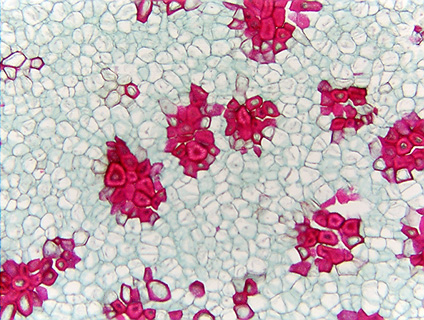 Fig.
5.3-1. Transverse section of fruit of pear (Pyrus). The groups
of red cells are the gritty things you notice when eating a pear. Each is a
group of sclerenchyma cells that are more or less isodiametric (that is, nearly
round, not long). Because they are not fiberlike sclerenchyma cells, they are
sclereids, and because they are very close to being round, they are brachysclereids,
also known as stone cells. See Fig. 5.3-2 for a higher magnification. The ground
tissue between the masses of brachysclereids is parenchyma. Each cluster
contains many brachysclereids, and the clusters are large enough to see with the
naked eye; take a look for them the next time you eat a pear.
Fig.
5.3-1. Transverse section of fruit of pear (Pyrus). The groups
of red cells are the gritty things you notice when eating a pear. Each is a
group of sclerenchyma cells that are more or less isodiametric (that is, nearly
round, not long). Because they are not fiberlike sclerenchyma cells, they are
sclereids, and because they are very close to being round, they are brachysclereids,
also known as stone cells. See Fig. 5.3-2 for a higher magnification. The ground
tissue between the masses of brachysclereids is parenchyma. Each cluster
contains many brachysclereids, and the clusters are large enough to see with the
naked eye; take a look for them the next time you eat a pear.